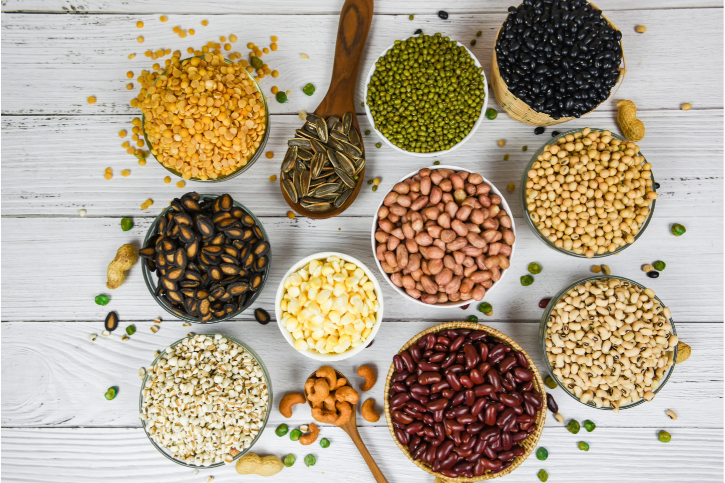
August 23, 2022 2 min read
Protein Grains
Protein is an essential nutrient that our bodies need to create energy. For vegans and vegetarians it can be difficult to find a plant-based protein source as a replacement for meat or animal products. It is important for those on a meatless diet to maintain a healthy protein intake by replacing the protein that meat provides.
Eating more plant-based protein can also be beneficial for non-vegans who want to cut down on their meat intake.
The recommended protein intake is 0.36 grams of protein per pound, or 10-35% of your daily calories. Your ideal intake may vary based on you and your lifestyle. This free protein calculator will calculate how many grams of protein you should be consuming per day based on your height, weight, age, and exercise habits. You can also multiply your weight by 0.36 to determine how many grams of protein you should be eating.

Seeds
If you find yourself getting snacky throughout the day, try these protein rich seeds. Protein makes you feel full longer and provides energy.
Sunflower seeds bring 6 grams of protein per ¼ cup. They are perfect to snack on, add to salads, or in trail mix.
Pumpkin seeds have 8 grams of protein per ounce (3 tbsp)
Chia seeds have 5 grams of protein for every 2 tbsp.
Hemp seeds aren’t exactly a snack food, but these seeds are packed with protein. Hemp seeds have 10 grams of protein per 3 tbsp. They are great to add to smoothies or salads.
Quinoa is technically classified as a seed and has 7 grams per serving (1/4 cup)

Oats
Oats are a nutrient-rich protein grain.
Oatmeal is a great breakfast choice, the protein provides energy and is very filling.
Thick rolled, regular rolled, quick rolled, and steel cut oats provide 7 grams of protein per serving.

Beans
Beans are the preferred source of protein for most people on a plant-based diet.
Chickpeas and black turtle beans have 10 grams of protein per serving, while dark red kidney, great northern, and navy beans have 11 grams per serving.
Lentils have similar protein content as beans. Green lentils provide 11 grams per ¼ cup and red lentils have 13 grams per ¼ cup.
❤ Try our USDA certified organic products ❤
Thanks for reading this Be Still Farms Blog article. To sign up for more news/articles and/or recipes, click here. For more about us, click here. To shop our certified organic products, click here.
Please comment and share and we look forward to serving you in the future!
Comments will be approved before showing up.

January 27, 2025 3 min read
Flaxseed, the tiny yet powerful superfood, is packed with nutrients that can support weight loss. From curbing hunger to stabilizing blood sugar, this guide dives into the science of how flaxseed can help you shed those extra pounds.

December 11, 2024 3 min read
Discover three quick and easy soup recipes featuring organic small red beans. From a classic vegetable soup to a creamy potato blend, these wholesome recipes are perfect for chilly days and busy weeknights. Packed with flavor and nutrition, these soups will warm your heart and soul this winter!

December 06, 2024 3 min read
This vibrant and nutritious Green Lentil Salad combines tender lentils with grilled chicken, fresh vegetables, and a zesty lemon dressing. Packed with protein, fiber, and essential vitamins, it’s the perfect healthy meal for any time of day.
© 2025 Be Still Farms- Real, Fine Organics.
Privacy | Terms | Refund Policy | Organic Certification
